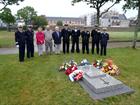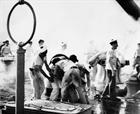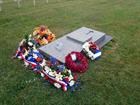Sailors from RFA Argus and 702 NAS honour French sailors
Sailors from RFA Argus and 702 Naval Air Squadron have paid their respects to French sailors killed when the Royal Navy attacked their fleet in harbour during the darkest hours of WW2.
The Britons joined French sailors and veterans at a memorial in Brest which remembers 1,297 men who died in the attack on Mers el Kébir in July 1940 which ruled out any chance the Nazis might use the French fleet to invade Britain.
In an age when the entente between the Royal Navy and Marine Nationale has never been more cordiale – Britain’s amphibious task group will exercise with the French this autumn while France’s carrier strike expertise is instrumental to helping HMS Queen Elizabeth into service – crew of aviation training and medical ship RFA Argus attended a memorial for the dead of Mers el Kébir.
Seventy-four years to the day of the attack on France’s warships, Royal Fleet Auxiliary and Royal Navy sailors, their French counterparts and veterans from both sides of the short, but bloody, battle between the two Fleets in 1940 held a service of remembrance for the 1,297 Frenchmen killed.
With the spectre of invasion of the British Isles looming, the Royal Navy was ordered to eliminate the French fleet as a threat – barely a week after the two navies had been allies in the struggle against Nazism.
The might of the British naval power in the Mediterranean – Force H based in Gibraltar, three battleships and the carrier Ark Royal – mustered off the port of Mers el Kébir, then in French Algeria, and the refuge of the kernel of the French battle fleet.
Although the Nazis had vowed not to touch the French Fleet under the armistice terms, Winston Churchill put no faith in Hitler’s promises.
The result was Operation Catapult: neutralising French ships in ports, wherever they may be. For vessels in British harbours, Catapult was an almost complete success; the ships surrendered to RN boarding parties without a fight, with the exception of submarine Surcouf, whose crew resisted. One Frenchman and two Britons were killed in the ensuing skirmish.
But in North Africa the French commander Admiral Marcel-Bruno Gensoul procrastinated until his opposite number, James Somerville, responded with fire shortly before 6pm on July 3.
The battle, such as it was, lasted under an hour. The aged battleship Bretagne blew up with the loss of nearly 1,000 souls. The more modern Dunkerque was damaged and run aground, as was the Provence and the destroyer Mogador.
Two days later Ark Royal’s bombers returned to the Dunkerque and sank the patrol boat Terre Neuve moored next to her – triggering depth charges and causing extensive damage to the battleship.
Taking a break from training Lynx helicopter air and ground crews of 702 Naval Air Squadron, Argus sailed into France’s main Atlantic naval base.
There her sailors joined members of the Mers el Kébir Association, led by its president Hervé Grall, and Cdr Marc Rollet, French Navy Liaison Officer, for a wreath-laying and short service of thanksgiving, where the Brits met families of those killed in the battle.
“Churchill described the engagement as ‘one of the most disagreeable and difficult tasks that a British admiral has ever been faced with’, so to meet the families and hear of the reconciliation that has since taken place, particularly the very close relationship that has been forged between the Mers-el-Kebir Association and the HMS Hood Association was particularly humbling,” said Capt David Eagles RFA, Argus’ Commanding Officer.
“It was a great honour for Argus to represent the Royal Navy in the presence of the Mers-el-Kebir Association and lay a wreath in commemoration of the French fallen.”





